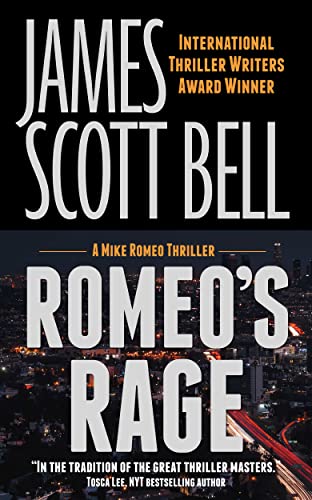
Sometimes somebody has an idea that just works. When an author comes up with a series character who engages mind and heart, and places him or her in stories that mean something to the reader, he’s got gold. James Scott Bell has produced gold in the Mike Romeo series, about a one-time cage fighter and certified genius on a quest for virtue. Romeo’s Rage entertained me and moved me.
Mike Romeo gets a call from a friend, a reformed gang member who now does Christian ministry with urban youth. It’s a hush-hush thing – the friend knows about a “package,” a child being delivered for prostitution purposes. He doesn’t have to ask twice for help in intervening. Mike and his friend execute a professional extraction and get the little girl to an “underground railroad” site.
Then things turn bad. The girl is taken again, and Mike’s friend is killed. They underestimated the bad guys.
Mike was mad about this criminal operation from the start. Now he’s really mad. And they won’t like him when he’s mad.
As Mike makes his plans and implements them, he’s assisted and restrained (somewhat) by his boss, Ira Levin, a wheelchair-bound ex-Mossad agent and current lawyer. Also he’s reevaluating his relationship with his girlfriend Sophie. He truly loves her, but feels her being close to him will make her a target – if not now, someday. If he loves her, he feels, he’s got to break it off.
Of course, Sophie might have something to say about that herself.
I want to be Mike Romeo when I get younger. Romeo’s Rage was thrilling and moving. I shed manly tears. Highly recommended.






